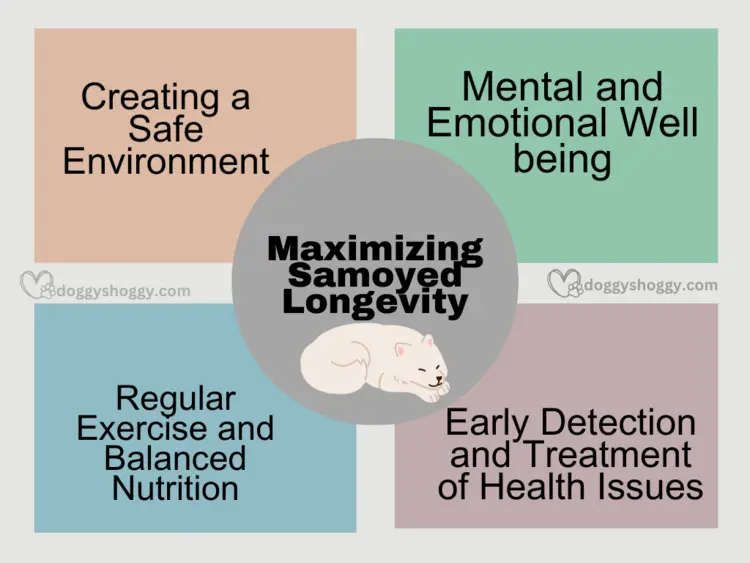Samoyed Lifespan

Samoyed
Samoyeds, those fluffy white dogs you might see, usually live from 12 to 14 years. That’s quite a long time for a dog! But how long they live can depend on a few things. Good breeding, which means choosing healthy parents, can help them live longer. Giving them healthy food, making sure they exercise, and taking them to the vet regularly can also help.
Weight
45-65 pounds
Height
21-23.5 inches
Lifespan
12 to 14 years
Breed
Samoyed
Table of Contents
Samoyed Lifespan: Key Factors

The Samoyed lifespan is influenced by various factors, determining how long these fluffy companions will grace our lives. Genetics, diet, exercise, and healthcare play pivotal roles in shaping their longevity.
Genetics and Breed Characteristics
Samoyeds, known for their stunning white coats and friendly demeanor, typically live between 12 to 14 years. However, individual lifespan can vary based on genetics inherited from their lineage. Responsible breeders focus on breeding healthy Samoyeds, minimizing the risk of hereditary diseases that could shorten their lifespan.
Nutritional Needs and Diet
Proper nutrition is essential for ensuring a long and healthy Samoyed lifespan. A balanced diet rich in high-quality proteins, healthy fats, vitamins, and minerals supports their overall well-being. Avoiding overfeeding and maintaining a healthy weight is crucial to prevent obesity-related health issues that can impact their lifespan.
Exercise and Mental Stimulation
Samoyeds are an active breed that thrives on regular exercise and mental stimulation. For better Samoyed lifespan daily walks, playtime, and engaging activities not only keep them physically fit but also stimulate their minds, preventing boredom and behavioral issues. Adequate exercise contributes to their overall health and can extend their lifespan.
Veterinary Care and Preventive Measures
Regular veterinary check-ups, vaccinations, and preventive care are essential for maintaining Samoyeds’ health and detecting any potential issues early on. Routine dental care, parasite prevention, and monitoring for common breed-specific health concerns can help prolong Samoyed lifespan and ensure a higher quality of life.
Maximizing Samoyed Longevity

While genetics play a significant role in Samoyed lifespan, there are steps owners can take to maximize their furry friend’s longevity and quality of life.
Creating a Safe Environment
Providing a safe and comfortable living environment is crucial for Samoyeds’ well-being. Minimizing exposure to hazards such as toxic substances, extreme temperatures, and potential accidents can help prevent injuries and health complications, contributing to a longer lifespan.
Mental and Emotional Well being
Samoyeds thrive on companionship and human interaction. Spending quality time bonding with them, providing mental stimulation through training and enrichment activities, and ensuring they feel loved and secure are essential for their emotional well-being, which in turn can positively impact Samoyed lifespan.
Regular Exercise and Balanced Nutrition
Consistent exercise tailored to their energy levels and dietary management are vital for maintaining Samoyeds’ overall health and preventing obesity-related health issues. A balanced diet consisting of high-quality ingredients tailored to their nutritional needs supports their immune system and contributes to longevity.
Early Detection and Treatment of Health Issues
Being proactive about monitoring Samoyeds’ health and seeking veterinary care at the first sign of illness or abnormal behavior can make a significant difference in their prognosis. Early detection and prompt treatment of health issues can prevent them from escalating into more severe conditions, potentially extending their lifespan.
For More: Jack Russell Breed
Health Considerations for Samoyed Lifespan

Despite their generally robust health, Samoyeds are prone to certain breed-specific health conditions that can affect their lifespan. Understanding these potential health issues allows owners to take proactive measures to mitigate risks and ensure their furry companions lead long and healthy lives.
Hip Dysplasia
Hip dysplasia is a common orthopedic condition in Samoyeds, characterized by abnormal development of the hip joint. It can lead to pain, lameness, and arthritis, affecting their mobility and quality of life. Regular exercise, maintaining a healthy weight, and providing joint supplements can help manage symptoms and improve their comfort.
Progressive Retinal Atrophy (PRA)
Progressive retinal atrophy is a hereditary eye disorder that can lead to gradual vision loss and blindness in Samoyeds. Annual eye examinations by a veterinary ophthalmologist can detect early signs of PRA, allowing for timely intervention and management to slow its progression and preserve their vision for as long as possible.
Hypothyroidism
Hypothyroidism occurs when the thyroid gland fails to produce enough thyroid hormone, resulting in metabolic imbalances and various health issues. Symptoms include weight gain, lethargy, and skin problems. Regular thyroid screening and medication management by a veterinarian can help regulate hormone levels and alleviate symptoms, improving their overall health and lifespan.
Samoyed Hereditary Glomerulopathy (SHG)
SHG is a genetic kidney disease that affects Samoyeds, leading to protein loss in the urine and kidney dysfunction. While there is no cure for SHG, early detection through regular urine and blood tests can help manage symptoms and slow the progression of kidney damage, prolonging their lifespan and maintaining their quality of life.
Smart dogs>>>
Tips for a Longer Samoyed Life

Ensuring a long and healthy life for Samoyeds involves a combination of proper care, preventive measures, and proactive management of their health. Here are some tips to help extend your furry friend’s lifespan and enhance their well-being.
Regular Veterinary Check ups
Schedule annual wellness exams with a veterinarian to monitor your Samoyed’s health, discuss preventive care measures, and address any concerns promptly. Regular check-ups allow for early detection of potential health issues, improving treatment outcomes and prolonging their lifespan.
Balanced Nutrition
Feed your Samoyed a balanced diet tailored to their nutritional needs, providing high-quality protein sources, essential fatty acids, vitamins, and minerals. Avoid overfeeding and limit treats to prevent obesity and related health problems, promoting a healthy weight and supporting their overall well-being.
Daily Exercise and Mental Stimulation
Engage your Samoyed in daily exercise and enrichment activities to keep them physically and mentally stimulated. Regular walks, playtime, and interactive toys help prevent boredom, reduce stress, and maintain their cognitive function, contributing to a longer and happier life.
Maintain a Healthy Weight
Monitor your Samoyed’s weight regularly and adjust their diet and exercise regimen as needed to prevent obesity. Excess weight puts strain on their joints and organs, increasing the risk of health issues such as arthritis, diabetes, and heart disease. Maintaining a healthy weight supports their overall health and longevity.
Dental Care
Practice good dental hygiene by brushing your Samoyed’s teeth regularly and providing dental chews or toys to help prevent tartar buildup and gum disease. Poor oral health can lead to systemic health issues and shorten their lifespan, so prioritize dental care as part of their overall wellness routine.
Provide a Safe Environment
Create a safe and secure environment for your Samoyed, free from hazards such as toxic plants, chemicals, and small objects they could ingest. Supervise them during outdoor activities to prevent accidents or injuries, minimizing risks that could impact their health and longevity.
Grooming and Hygiene
Maintain your Samoyed’s coat and skin health through regular grooming sessions, including brushing to remove loose fur and prevent matting. Bathe them as needed with a gentle shampoo formulated for dogs to keep their coat clean and healthy. Pay attention to their ears, eyes, and paws for signs of infection or irritation, addressing any issues promptly to prevent complications.
Socialization and Training
Expose your Samoyed to various social situations, people, and other animals from a young age to promote positive behavior and prevent anxiety or aggression. Enroll them in obedience training classes to teach essential commands and manners, fostering a strong bond and communication between you and your furry companion.
Mental and Emotional Well being
Prioritize your Samoyed’s mental and emotional well-being by spending quality time together, providing companionship, and engaging in activities they enjoy. Offer plenty of love, attention, and positive reinforcement to strengthen your bond and create a supportive environment that promotes their happiness and longevity.
Monitor Health Changes
Stay vigilant for any changes in your Samoyed’s behavior, appetite, or activity level, as these could be early signs of health issues. Keep a record of their symptoms and communicate any concerns with your veterinarian promptly. Early detection and intervention are key to managing health problems effectively and maximizing your furry friend’s lifespan.
Bottom Line
Ensuring a long and healthy life for your Samoyed requires dedication, preventive care, and proactive management of their health. By providing proper nutrition, regular exercise, veterinary care, and a safe and supportive environment, you can help maximize their lifespan and enjoy many happy years together with your beloved furry companion.
Useful and Unique FAQs with Answers
How long do Samoyeds typically live?
Samoyeds usually live between 12 to 14 years, although individual lifespan can vary based on genetics and lifestyle factors.
What are some common health issues in Samoyeds?
Common health issues in Samoyeds include hip dysplasia, progressive retinal atrophy (PRA), hypothyroidism, and Samoyed hereditary glomerulopathy (SHG).
How can I help my Samoyed live longer?
Providing proper nutrition, regular exercise, vet care, and a safe environment while monitoring their health can help maximize your Samoyed’s lifespan.
Are Samoyeds prone to obesity?
Samoyeds can become overweight if overfed or lacking exercise, so maintaining a healthy weight through balanced nutrition and regular activity is crucial.
Do Samoyeds require a lot of exercise?
Samoyeds are an active breed that requires daily walks, playtime, and mental stimulation to keep them physically fit and mentally engaged.
How often should I take my Samoyed to the vet?
Annual wellness exams are recommended to monitor their health, with additional visits for vaccinations, dental care, or specific health concerns.
Can Samoyeds live in hot climates?
While they have a thick double coat suited for cold climates, Samoyeds can adapt to warmer environments with proper care such as shade, water, and avoiding strenuous activity during the hottest times.
Are Samoyeds prone to dental problems?
Regular brushing, dental chews, and professional cleanings are essential for preventing dental problems like tartar buildup and gum disease.
Do Samoyeds require grooming?
Samoyeds require regular grooming to maintain their dense double coat, including weekly brushing, occasional baths, and trimming around the ears and paws.
Are Samoyeds good with children and other pets?
Samoyeds are known for their friendly and gentle nature, making them great companions for families with children and other pets when properly socialized and trained.

